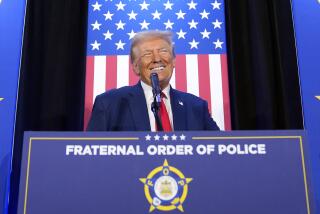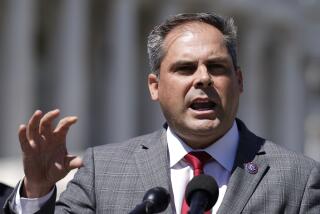Gore Says He’ll Spend More to Fight Crime
RAYTOWN, Mo. — Vice President Al Gore said Wednesday that he will increase federal funding for crime-fighting programs if he becomes president and accused Republican rival George W. Bush of choosing to spend money on tax cuts over the needs of law enforcement.
Gore said he wants to add to President Clinton’s program of funding 100,000 more police officers--a target that has not been met--with an additional 50,000 officers and 10,000 new prosecutors nationwide.
“Here is my commitment: the toughest, most effective anti-crime strategy this nation has ever seen, more police and more prosecutors to widen the thin blue line between order and disorder,” Gore told police officers and local officials at City Hall in Raytown, a middle-class suburb of Kansas City.
Gore estimated the cost of his law enforcement proposals at $1.1 billion over 10 years and said Bush’s proposed tax cuts would make it difficult for a Republican administration to fund a similar program.
“We have to have responsible budgeting so that we don’t put a tax cut for the wealthy ahead of crime-fighting or health care or education,” he said.
The vice president, who has increasingly focused his campaign on attacking Bush’s record as governor of Texas, said he will make a previously unannounced visit to San Antonio today to draw attention to the state’s fiscal problems.
“How Gov. Bush has run Texas is relevant to the judgment the American people will make as to how he would run the country if they ever gave him the chance,” Gore said.
Bush spokesman Ari Fleischer fired back: “We look forward to welcoming [Gore] to the land where taxes are low and the budget is in surplus. . . . Al Gore said he was making a progress and prosperity tour, but he’s turned it into a distort and destroy mission.”
The two campaigns spent much of the afternoon firing volleys of Texas budget numbers at each other. Gore aides said Texas is running into a $610-million budget shortfall, and that the state has one of the smallest “rainy day” funds in the country. Bush aides said the shortfall had been expected, and predicted that the budget would show a net $400-million surplus by the end of the current two-year budget cycle.
Whatever the outcome, Gore aides were visibly pleased to have started the argument. One of their strategic goals at this stage of the campaign is to poke holes in Bush’s image as a successful governor.
“People don’t know that much about George W. Bush,” one senior Gore aide said. “We’re trying to affect their image of him. . . . We want to puncture a hole in his campaign just as Boston Harbor punctured a hole in Dukakis.”
He was referring to the 1988 presidential campaign, when Republican candidate George Bush--the Texas governor’s father--staged a trip to Boston to point out that Massachusetts Gov. Michael S. Dukakis, the Democratic candidate, had failed to clean his own famously polluted harbor.
On crime, Gore has sought to expand on Clinton’s popular pledge to use federal money to fund the hiring of 100,000 police officers, although the administration has won funding from Congress for only about 60,000 jobs.
Gore said he would seek funding for the remaining 40,000 Clinton cops, plus 50,000 more.
“Part of the reason for crime in the streets is paralysis in our courts,” he said. Federal studies have found that many local prosecutors’ officers are understaffed, and prosecutors often argue that they could convict more criminals if they had more lawyers.
Gore also said he would ask Congress to fund law enforcement task forces for “hot spots,” areas where the crime rate has not declined.
Gore, a technology buff, said he wants some of that money to give more police departments “mapping technology”--a computerized technique that plots crime patterns on a map and enables police to focus their work more effectively.
In a Republican response, Sen. Charles E. Grassley of Iowa charged that Gore has paid little attention to crime during almost eight years as vice president.
“The real crime here is the Clinton-Gore record on drugs,” Grassley said in a telephone conference call with campaign reporters. “He should explain why, during the Clinton-Gore administration, the number of teenagers using drugs nearly doubled.”
The announcements were elaborations on a crime-fighting plan Gore announced earlier this year. He has long proposed funding an additional 50,000 police officers, but the details of his proposals for more prosecutors and for a “hot spots” program are new.
More to Read
Get the L.A. Times Politics newsletter
Deeply reported insights into legislation, politics and policy from Sacramento, Washington and beyond. In your inbox three times per week.
You may occasionally receive promotional content from the Los Angeles Times.











